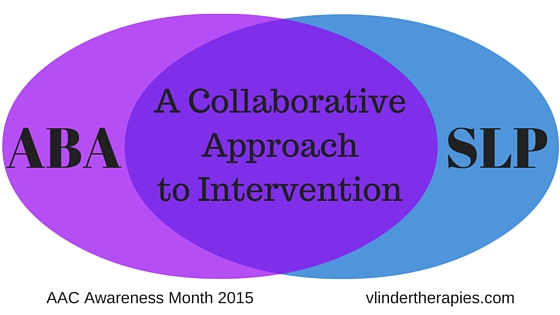ABA & SLP: A Collaborative Approach to Intervention (guest post)
My good friend, Lisette, graciously agreed to write a guest article for my AAC Awareness Month newsletter this year! We met several years ago when I began a new job and was lucky enough to find myself on a team with her, sharing the same clients. What started out as co-workers has evolved into a beautiful friendship! I appreciate Lisette taking a moment to share her thoughts on SLPs and Behavior Specialists teaming up.
This is also available in .pdf format for download here.

I appreciate the opportunity to share my interest in this very important topic. That being, not only the benefits of coordination between ABA and SLP services, but the necessity for this collaborative model to occur. First, my personal interest comes from my background. I hold a BA in Speech Pathology and later obtained an MA with a focus in Behavior Analysis. As I immersed myself in the field of ABA while working with children and adults with Intellectual Disabilities, it became evident to me that optimal treatment requires the expertise of both a Behavior Analyst (BCBA) and an experienced Speech-Language Pathologist (SLP).
The fields of Behavior Analysis and Speech-Language Pathology often both work to improve many of the same skills for the clients they serve. From teaching alternative ways to communicate to reading skills, speech fluency, emotional regulation strategies and various other expressive and receptive communication needs. Speech-Language Pathologists and Behavior Analysts alike also must identify and manage behavioral issues, which interfere with learning, and teach more appropriate and alternative behaviors.
Behavior Analysts and Speech-Language Pathologists both may specialize in treating specific populations (i.e. children with autism) and often with a goal of generalizing those skills across all settings the individual is in (directly teaching the same skills across home, school, community). More often than not, one of the most socially significant behaviors identified is an individual’s communication needs. A primary goal of ABA is identifying possible environmental factors (motivation, instructions, prompts, consequences) to determine why certain behaviors occur and then adjusting those factors in order to help individuals make positive behavior change.
SLPs, because of their specific training and experience, have the ability to identify subtle influences that can make ABA more effective. This ability to adjust interventions at a very detailed level demonstrates the SLP’s knowledge in important areas related to behavior, such as the impact of certain processes related to brain function.
For the BCBA, once a Functional Assessment identifies the motivation or cause of the behavior and an alternative communicative goal is identified for teaching, the SLP can assist in identifying the most appropriate communication system to address the individual’s communication strengths and weaknesses. Conversely, when a Speech-Language Pathologist assesses and determines communication goals, the Behavior Analyst can assist with behavioral issues that may arise while this shift in learning occurs, as well as evaluate reinforcement systems.
As a team, it is evident to me that BCBA’s and SLP’s are well suited to provide state of the art treatment for individuals within their care and doing so will depend on their mutual understanding of each other’s abilities.
Lisette Randich, BCBA
Lisette Randich is a Board Certified Behavior Analyst (BCBA). She has been working with children and adults with developmental disabilities for the past 17 years across settings in Illinois, Colorado and Washington State. Her areas of specialty include the assessment & intervention of severe challenging behaviors and working with young adults transitioning to adulthood. She is the proud mother of 3 boys and currently lives on the Eastside.
You might also be interested in this post:
On the Importance of Being Part of the TEAM
 Thursday, October 8, 2015 at 9:00PM
Thursday, October 8, 2015 at 9:00PM  Post a Comment →
Post a Comment →  AAC Awareness Month,
AAC Awareness Month,  behavior,
behavior,  teaming | in
teaming | in  AAC
AAC
Reader Comments